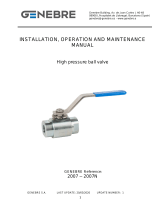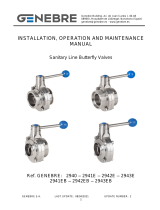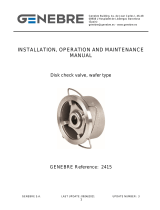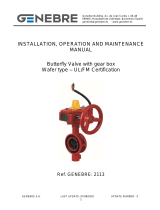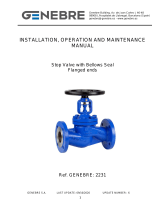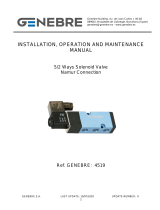
Genebre Building. Av. de Joan Carles I, 46-48
08908 L'Hospitalet de Llobregat. Barcelona (Spain)
genebre@genebre.es - www.genebre.es
GENEBRE S.A.
LAST UPDATE: 08/11/2011 UPDATE NUMBER: 0
1
INSTALLATION, OPERATION AND MAINTENANCE
MANUAL
Forged Globe Valves Class 800
With threaded, Socket Weld or Flange ends
Ref. GENEBRE: 2233N – 2233S – 2233A

Genebre Building. Av. de Joan Carles I, 46-48
08908 L'Hospitalet de Llobregat. Barcelona (Spain)
genebre@genebre.es - www.genebre.es
GENEBRE S.A.
LAST UPDATE: 08/11/2011 UPDATE NUMBER: 0
2
Installation, operation and maintenance instructions
1. Product description ............................................................................... 3
2. Transport and Storage conditions ....................................................... 3
3. Installation instructions …….............................................................. 4
3.1 Preparation ………………….................................................................. 4
3.2 Installation of valves with threaded ends (2233N) ……………………... 4
3.3 Installation of valves with flanged ends (2233A) …………......………... 5
3.4 Installation of valves with socket weld ends (2233S) ……….………... 5
4. Operating instructions
4.1 Usage .................................................................................................... 6
4.2 Manual operation .................................................................................. 6
5. Maintenance instructions ...................................................................... 6
6. Reparation instructions ....................................................................... 7
7. Hygiene and Safety Instructions ........................................................... 7

Genebre Building. Av. de Joan Carles I, 46-48
08908 L'Hospitalet de Llobregat. Barcelona (Spain)
genebre@genebre.es - www.genebre.es
GENEBRE S.A.
LAST UPDATE: 08/11/2011 UPDATE NUMBER: 0
3
1. Product description.
Genebre, S.A. offers a wide range of valves designed and assembled to handwheel and
drive fluids in industrial procedures.
The compatibility of materials used to build the valves (see technical specifications) and
the application of valves to the different industrial processes is at user's risk. Valves will
have an optimal behavior when working conditions do not exceed pressure and
temperature limits (pressure curve) for which they have been designed.
2. Transport and Storage conditions
Transport and storage of this kind of products must be done keeping them in their
original package!
VISUAL INSPECTION
Check whether during transport, unloading and placement the products have suffered
damages.
During storage it is recommended to keep them into the included protective wrapping to
avoid damages or dirt accumulation in the inside part of the valve.The wrap must not be
removed until valve is to be installed.
Valves must be stored in a dry and clean environment.
If you notice any kind of anomaly during reception of the goods, contact immediately
with GENEBRE in order to determine the possible responsibilities on the issue.
IMPORTANT NOTE:
Before installing and/or manipulating these elements, READ CAREFULLY these
instructions for use and OBSERVE all contained information. If you fail to
understand any of their content, please contact GENEBRE, S.A.

Genebre Building. Av. de Joan Carles I, 46-48
08908 L'Hospitalet de Llobregat. Barcelona (Spain)
genebre@genebre.es - www.genebre.es
GENEBRE S.A.
LAST UPDATE: 08/11/2011 UPDATE NUMBER: 0
4
User is responsible for the safe use of these products, according to present
instructions for use and specific technical documentation of the device.
3. Installation instructions
3.1) Preparation
Remove any material remains of the valve wrapping.
Serious problems may arise with the installation of a valve in a dirty pipe.
Make sure the pipe is not dirty and doesn’t have welding particles, for example, before
installing it. This may cause irreparable damages in the valve when the equipment is
started → prepare a clean working area.
Plan beforehand enough space for future maintenance operations.
Control the correct performance of the valve by turning the handwheel both sides (close
and open) and observing if the disc or needle slides correctly. If this is not the case,
check if there are foreign particles inside the valve and repeat the whole operation.
3.2) Installation of valves with threaded ends (2233N)
Do not disassemble the valves to install them.
Make sure the valve's pipe and thread end are clean and are compatible one with
another (type of thread end) Apply an appropriate sealing into the pipes' thread ends and
thread the valve being careful not to excessively tighten the conical threaded ends.
Do not use valve's handwheel as a lever to thread the valve into the pipe.
To tighten the valve into the pipe it is recommended to use a correct wrench only on the
body central assembly; the force applied needs to be less than 30 Nm.
Design for this kind of regulation valves allows only one position for
assembling it to the pipe, specified by means of an arrow in the valve's body
that indicates the direction in which the fluid needs to circulate.

Genebre Building. Av. de Joan Carles I, 46-48
08908 L'Hospitalet de Llobregat. Barcelona (Spain)
genebre@genebre.es - www.genebre.es
GENEBRE S.A.
LAST UPDATE: 08/11/2011 UPDATE NUMBER: 0
5
3.3) Installation of valves with flanged ends (2233A)
Do not disassemble the valves to install them.
Make sure the pipe's and edges flanges of the valve are clean.
Use the corresponding screws in all of the flanges drill holes.
Place an adequate joint in each end and align it in the center of the flanges.
Tighten screws evenly and cross-shaped to avoid deformations. To do so, you must not
force in any case the pipe to center the valve; it should take its position smoothly. Last,
verify that screws are tightened with the recommended torque for each type of screw.
Make sure the flanges joints are well placed.
After assembling, check the tightness and performance of the valve.
3.4) Installation of valves with socket weld ends (2233S)
Do not disassemble the valves to install them.
3.4.1 Is necessary a clean area for work.
3.4.2 Genebre, S.A. recommends the use of electric welding methods (TIG, MIG).
3.4.3 Use cooling during the welding process.
3.4.4 Welding to be performed by a qualified welder.
3.4.5 Excessive heating of the valve must be avoided during the welding.
3.4.6 When the valve is installed in a horizontal piping, it must be in the open position for
protection of the seat.
3.4.7 When the valve is installed in a vertical piping, the valve shall be open when the
upper seam is welded and when the lower seam is welded the valve shall be
closed.
3.4.8 Do no open/close the valve immediately after welding. Wait the valve cool before
operating it.
3.4.9 If is necessary to make the pressure test Genebre, S.A. recommend use the
instruction of European Standard EN ISO 15761:2002.

Genebre Building. Av. de Joan Carles I, 46-48
08908 L'Hospitalet de Llobregat. Barcelona (Spain)
genebre@genebre.es - www.genebre.es
GENEBRE S.A.
LAST UPDATE: 08/11/2011 UPDATE NUMBER: 0
6
If possible, it is recommended to install the valve in horizontal position and the
handwheel upwards.
Valves do not have to support pipe's efforts so it is advisable to anticipate a good
alignment and parallelism of such pipe.
It is also recommended to use filters in the pipe to extend lifecycle of the valve.
4. Operating instructions
4.1) Usage
GENEBRE valves provide a leakproof lock when used adjusted to the pressure and
temperature values for which they have been designed.
Valve materials have to be fully compatible with the fluid circulating through the valve.
Otherwise, valve could be seriously damaged.
Do not use for slurries or fluids containing solids that can build up in valve
cavities.
4.2) Manual operation
When operating the valve you must avoid excessive lateral efforts with the handwheel.
To close, the operation consists in turning the handwheel clockwise and anticlockwise if
you want to open the valve.
5. Maintenance instructions
Frequency, place and process of maintenance will be determined by the user by taking
into account usage of the product. However, periodical checks explained below will be
useful to extend the service life of the valve and reduce installation problems.
5.1) Valves must not remain in open or closed position for a long period of time. It is
recommended, if the process allows for it, to operate it for control purposes every six
months.
5.2) Verify possible leaks in the stem area; in case they exist, proceed to tighten the
gland nut. If leak persists, valve should be replaced (see section 3).

Genebre Building. Av. de Joan Carles I, 46-48
08908 L'Hospitalet de Llobregat. Barcelona (Spain)
genebre@genebre.es - www.genebre.es
GENEBRE S.A.
LAST UPDATE: 08/11/2011 UPDATE NUMBER: 0
7
5.3) Verify possible leaks through the line (due to closure); this defect is probably caused
by deposition of impurities between the disc or needle and the seat, transported by the
fluid. Disassemble the valve from the pipe, clean it thoroughly and reinstall it. If the
problem persists you should change the valve, since it is possible that some metallic
parts used for closure are damaged (erosion, corrosion). See section 6 for further details.
6. Reparation instructions
These types of valves, due to their assembling specifications are not worth repairing,
because most of the times are simply not cost-effective, so we recommend to directly
replace them.
7. Hygiene and Safety Instructions
7.1) Fluid passing through a valve or accessory can be corrosive, toxic, flammable or
pollutant. When operating valves, you must follow the security instructions and it is
recommended to use personal protection gadgets:
1) Protect your eyes.
2) Wear gloves and appropriate working clothes.
3) Wear safety footwear.
4) Wear a helmet.
5) Have running water at hand.
6) To operate flammable fluids, make sure you have an extinguisher at hand.
Before disassembling the pipe's valve to clean or replace it, make sure that line
has been closed and depressurized because a bad operational procedure could
cause a serious accident to staff and installation system
Before installing new valve, check if it meets the requirements of the valve
being replaced

Genebre Building. Av. de Joan Carles I, 46-48
08908 L'Hospitalet de Llobregat. Barcelona (Spain)
genebre@genebre.es - www.genebre.es
GENEBRE S.A.
LAST UPDATE: 08/11/2011 UPDATE NUMBER: 0
8
7.2) Before removing a valve from a pipe, check always if the line is completely
drained and depressurized.
7.3) Operate the valve in open position to make sure there is no pressure in the internal
cavity.
7.4) Any valve being used by toxic services department needs to obtain a cleanliness
certificate before being operated.
/
